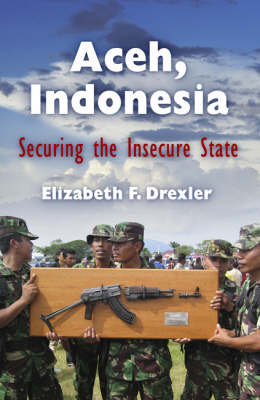9780812240573 - Aceh, Indonesia: Securing the Insecure State di Drexler, Elizabeth F. (1 risultati)
Tipo di articolo
- Tutti gli articoli
- Libri (1)
- Riviste e Giornali
- Fumetti
- Spartiti
- Arte, Stampe e Poster
- Fotografie
- Mappe
-
Manoscritti e
Collezionismo cartaceo
Condizioni
- Tutte
- Nuovi
- Antichi o usati
Legatura
- Tutte
- Rilegato
- Brossura
Ulteriori caratteristiche
- Prima edizione
- Copia autografata
- Sovraccoperta
- Con foto
- No print on demand
Paese del venditore
Valutazione venditore
-
Aceh, Indonesia. Securing the Insecure State.
Editore: University of Pennsylvania Press., Philadelphia., 2008
ISBN 10: 081224057XISBN 13: 9780812240573
Da: Asia Bookroom ANZAAB/ILAB, Canberra, ACT, Australia
Libro Prima edizione
First Edition. Maps, black and white photographic illustrations, 287pp, notes, glossary, bibliography, index, very good dustjacket and hardcover copy. "In 1998, Indonesia exploded with both euphoria and violence after the fall of its longtime authoritarian ruler, Soeharto, and his New Order regime. Hope centered on establishing the rule of law, securing civilian control over the military, and ending corruption. Indonesia under Soeharto was a fundamentally insecure state. Shadowy organizations, masterminds, provocateurs, puppet masters, and other mysterious figures recalled the regime's inaugural massive anticommunist violence in 1965 and threatened to recreate those traumas in the present. Threats metamorphosed into deadly violence in a seemingly endless spiral. In Aceh province, the cycle spun out of control, and an imagined enemy came to life as armed separatist rebels. Even as state violence and systematic human rights violations were publicly exposed after Soeharto's fall, a lack of judicial accountability has perpetuated pervasive mistrust that undermines civil society. Elizabeth F. Drexler analyzes how the Indonesian state has sustained itself through anxieties and insecurities generated by historical and human rights accounts of earlier violence. In her examination of the Aceh conflict, Drexler demonstrates the falsity of the reigning assumption of international human rights organizations that the exposure of past violence promotes accountability and reconciliation rather than the repetition of abuses." (Publisher's description).


